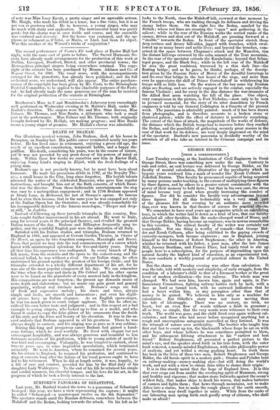BURFORD'S PANORAMA OF SEBASTOPOL.
Last year, Mr. Burford treated the town to a panorama of Sebastopol besieged : this year, we have a view representing the capture ; it might be called " Sebastopol—a quarter-past twelve on the 8th September." The spectator stands amid the Russian defences, somewhere between the Malakoff and the &den, looking towards the attack. On his left as he looks to the North, rises the Malakoff hill, crowned at that moment by the French troops, who are rushing through its defences and driving the enemy before them. On the right lies the Redan, assailed by the British; whose red lines are crossing the "open' and gathering in the salient; while in the rear of the Russian works the serried ranks of the enemy, driven and shut out of the Malakoff, are pressing forward at a "double" towards the Bedell. In front of the spectator stretch those deep ravines and dreary hill-sides, jagged with trenches, which swal- lowed up so many brave and noble lives ; and beyond the trenches, com- prised in the space between Chapman's attack and the Mamelon, rise the distant hill-tops crowned by the calm summit of the Teat mountain., In the rear of the spectator extends the Karabelnaia ; beyond that &balk! topol proper, and the Black Sea ; while in the left rear of the Malakoff he sees the great roadstead, traversed by a thin dark line—the floating bridge ; and as he gazes, he thinks, perhaps, of the descrip- tion given by the Russian Sister of Mercy of the dreadful hurryings to and fro over that bridge in the last hours of the siege, and more than ever he appreciates the skill of Prince Gortschakoff in withdrawing his troops with so little loss. On the waters of the bay some big Russian ships are floating; and are actively engaged in the combat, especially the famous Vladimir ; and far away in the dim distance the war-steamers of the Allied fleet seem watching the fall of the place. One object, very conspicuous in the picture, is Fort Nicholas,—now only to be seen in pictured memorial, for the story of its utter demolition by French engineers is told by our General Codrington in a Gazette of the present week. The panorama is admirably painted: much of it has been drawn from photographs, and is therefore accurate to a broken stone or shattered gabion; while the effect of distance is positively surprising, The extent of the lines of attack, the magnitude of the works of defence; the distance which the British troops had to traverse before they reached the Roden, and the possibility of gathering securely great masses in the rear of that work for its defence, are very deeply impressed on the mind of the spectator. Burford's new panorama is decidedly worthy of the attention of all who take an interest in the Crimean campaign and its issue.


























 Previous page
Previous page